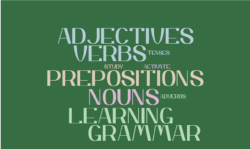
So, what is new in grammar in 2024? Ah, same as was new in 2023 and likely in 2022. People say that grammar evolves, but it doesn’t evolve much, and it doesn’t evolve very quickly. All the grammar topics that are discussed in this blog post have been covered in previous posts, since this blog has been going for about 13 or so years, every week.
If you want to read about any of the grammar topics mentioned in this post, you can go to the home page on your computer (not on the mobile view); in the upper righthand corner is a little search icon. Click it and you can search the site. You will find blog posts that are relevant to that grammar topic. And there are often more than one.
The same “changes” that are supposedly current have been around for a while:
- You can end a sentence with a preposition. “Whom are you going with?” Much simpler than “With whom are you going?”
- You can start a sentence with a conjunction if it makes sense. Not so much recommended for formal, academic writing. “And to sum up, these are the three reasons I believe this will work.”
- Apparently the distinction between who and whom is still around. I read several years ago that by 2025 that distinction would be history. Well, we do have another two months!
- The singular they is fine to use and more inclusive and less awkward than he or she. “Each student should pick up their ticket for the dance today.”
- The split infinitive is acceptable. But then some say it isn’t. I thought that debate was over, and it is acceptable. “… to boldly go where no man has gone.” versus “…to go boldly where no man has gone.”
Even when I was teacher (I left in 2015), there were two schools of thought on how to teach grammar. Many believe in teaching grammar in the context of the writing and literature the students were doing and reading. I never liked that method. I always thought those who taught that way didn’t like grammar and didn’t know the rules — or care about them. That is called deductive teaching. Teaching grammar as its own subject is inductive teaching.
Did you know that there are apparently 12 rules of grammar? I didn’t. I have many more rules than that in my books! If you do a search for grammar rules, you will also see that there are 5 or 10 grammar rules. I looked at a couple of lists of the 12 (magic?) grammar rules, and although they are similar, they are not identical.
Here is one list of the 12 grammar rules:
- Subjects and verbs in a sentence must agree.
- Tenses should be used in a consistent manner.
- Correct articles should be used (a, an, the).
- Complete sentences should be used.
- Correct capitalization should be used.
- Correct pronouns should be used.
- Correct prepositions should be used (at, in, by, etc.)
- Conjunctions should be used for linking words, phrases, etc.
- Commas should be used for clarity.
- Apostrophes should be used only for possessives and contractions.
- Word order should be switched for questions (DUH).
- Use clear commands (imperatives). Another DUH.
Here is the other list I found:
- Sentences must have a noun and a verb. (Not even true. What about a pronoun? )
- Sentences must have a subject and a predicate.
- Sentences must have punctuation at the end.
- Use articles, and use them correctly.
- Use capital letters correctly.
- Use adverbs and adjectives correctly.
- Use tenses correctly.
- Use quantitatives correctly: fewer/less and number/amount
- Use active voice.
- Use correct prepositions.
- Use apostrophes for possessives.
- Use correct conjunctions.
What did you notice about these lists? To me, they seems like lists for grammatically correct writing. Most of them really aren’t rules. How to use capitals correctly: those are rules. Anyway, I assume that is what the “powers that be” think is most important in the basics of writing decently, and I guess for the most part, they are correct.
If you want the nitty gritty of the actual rules of any of the topics, as I said, just search my blog posts on the home page. (Oh, or buy one of my grammar books – shameless plug).
Til next week….



Deductive grammar is a subject up with which I will not put!
Good one! 🙂 🙂 🙂